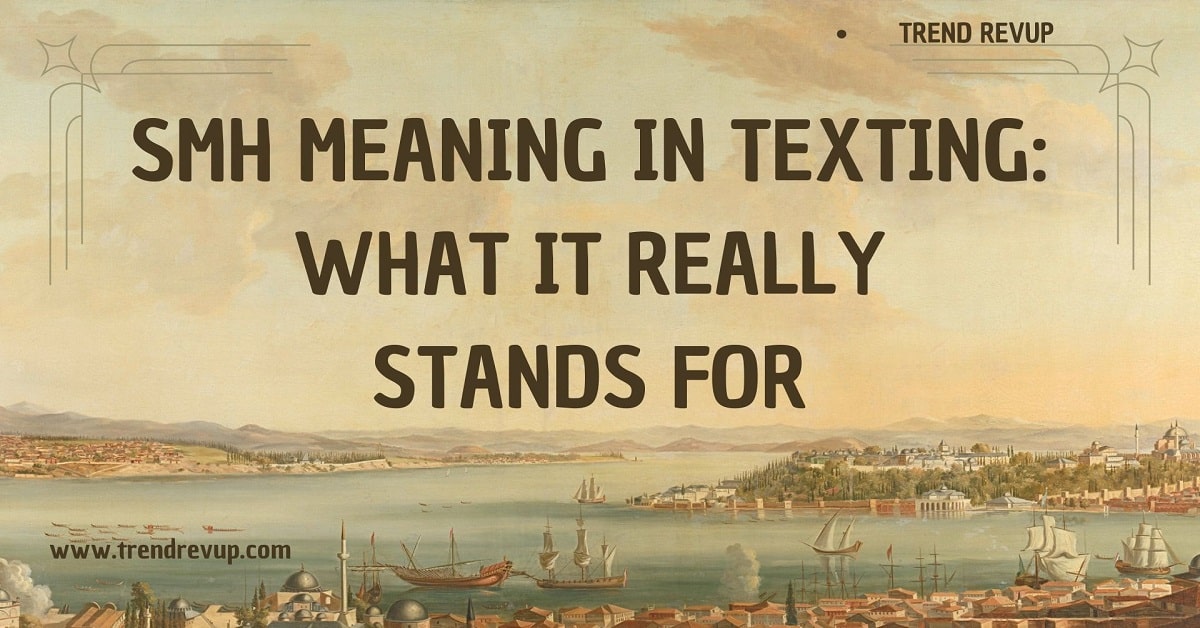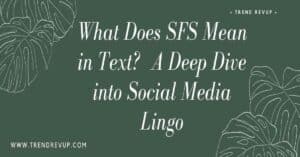SMH meaning in texting might have left you scratching your head or shaking it, ironically! If you’ve come across this acronym in messages or social media and wondered what it stands for, you’re not alone. SMH is one of those internet terms that packs a lot of attitude into just three letters, making it a favorite in digital conversations.
Curious about how and when to use SMH? You’re in the right place! In this guide, we’ll not only break down its meaning but also share real-life examples so you can master it effortlessly. Get ready to level up your texting game!
The Basic Breakdown: What Does SMH Actually Mean?
Let’s start with the fundamentals: SMH stands for “shaking my head.” It’s the textual embodiment of that universal gesture we all know and love the slow, deliberate head shake that speaks volumes without saying a word. Think of it as the digital equivalent of that moment when words fail you, and only a disappointed head shake will do.
But here’s where it gets interesting: SMH isn’t just a simple acronym; it’s become a cultural phenomenon that transcends its literal meaning. It’s the perfect response when you’re faced with something so monumentally facepalm-worthy that you need to physically express your disbelief, even in a virtual space.
The Historical Journey: From Head Shakes to Hashtags
The Ancient Art of Head Shaking
Before we dive deeper into the modern usage of SMH, let’s take a fascinating detour into history. The head shake as a gesture of disapproval isn’t just a recent phenomenon – it’s been documented across cultures for thousands of years. Ancient Greek texts mention head shaking as a sign of disagreement, and the gesture appears in literature and art throughout human history.
The Digital Revolution
Fast forward to the early 2000s, when text messaging and internet forums were becoming mainstream. As communication moved increasingly online, people needed ways to express non-verbal cues in written form. This era saw the birth of many popular acronyms we use today, including SMH.
The earliest documented use of SMH in online forums dates back to the mid 2000s, but it really gained traction with the rise of Twitter in the late 2000s. The platform’s character limit made acronyms like SMH not just convenient but necessary for expressing complex emotions in limited space.
The Psychology Behind SMH: Why We Love to Shake Our Heads
The Universal Language of Disapproval
There’s something uniquely satisfying about using SMH. Psychologists suggest that expressing disapproval through gestures (even virtual ones) can serve as a stress relief mechanism. When we use SMH in text, we’re not just communicating disappointment we’re participating in a shared emotional experience.
The Social Bonding Aspect
Using SMH often creates a sense of community among users. When multiple people respond to something with SMH, it creates a collective moment of judgment or disbelief, bringing people together through shared reactions.
When to Use SMH: A Comprehensive Guide
The Classic Scenarios
- The Technology Fail
- When someone tries to charge their wireless earbuds by sticking them in their ears
- The person who keeps falling for obvious phishing emails
- Anyone who thinks closing apps faster makes their phone charge quicker
- The Social Media Blunders
- Those who post relationship drama on their public profile
- People who share obviously fake news without fact checking
- Instagram influencers photoshopping themselves into obviously fake situations
- The Daily Life Moments
- Watching someone put an empty milk carton back in the fridge
- Seeing people walk into poles while texting
- Witnessing someone try to push a pull door repeatedly
Advanced Applications and Variations
The SMH Intensity Scale
- SMH: Standard disapproval
- SMFH: Enhanced disapproval (handle with care!)
- SMDH: “Shaking my damn head” when you need something between regular and extreme
- SMH x1000: For those truly spectacular moments of disbelief
Creative Combinations
Modern texting has evolved to include creative SMH combinations that express nuanced emotions:
- “SMH + 😂” Disapproval with amusement
- “SMH + 🤦♀️” The double whammy of head-shaking and face palming
- “SMH + …” When you’re so disappointed you can’t even finish the thought
The Global SMH Phenomenon
Cultural Variations
Different cultures have developed their own unique takes on SMH:
- British Version: Often accompanied by “mate” or “bloody hell”
- Australian Style: Might include “crikey” or “strewth”
- Canadian Variation: Usually followed by “sorry”
- Gen Z Edition: Often combined with “no because…” or “I can’t-“
International Impact
SMH has transcended language barriers, becoming one of the few truly international internet acronyms. Even in non English speaking countries, people understand and use SMH in its original form.
SMH in Professional Settings: A Delicate Balance
When It’s Okay
- Casual Slack channels with colleagues
- Internal team communications with a relaxed culture
- Social media posts from company accounts (when appropriate)
When to Avoid
- Formal business emails
- Client communications
- Performance reviews (obviously)
- Job applications (seriously, don’t)
The Evolution of Digital Disapproval
From SMH to Modern Alternatives
While SMH remains popular, new expressions of digital disapproval keep emerging:
- “Dead 💀” Gen Z’s way of expressing disbelief
- “I’m done” The verbal equivalent of SMH
- “Bruh” Often used interchangeably with SMH
- “Screaming” When SMH just isn’t enough
Future Predictions
As technology evolves, we might see:
- AR filters that detect head shaking and automatically add SMH to messages
- AI that suggests the perfect SMH moment in conversations
- Virtual reality environments where your avatar physically shakes its head when you type SMH
Common Misconceptions and FAQs
“Isn’t SMH Old Fashioned?”
While it’s been around for a while, SMH shows no signs of going out of style. Unlike other internet slang that has come and gone, SMH fills a unique niche in digital communication.
“Does SMH Always Mean Disapproval?”
Not necessarily! Context is key. Sometimes SMH can be playful or even affectionate, especially among friends.
“Can SMH Be Passive-Aggressive?”
Like any form of communication, the tone depends on the context and relationship between the people involved.
The Art of Using SMH Effectively
Best Practices
- Timing is Everything
- Use it reactively, not preemptively
- Give serious situations appropriate gravity
- Don’t overuse it (yes, SMH fatigue is real)
- Context Matters
- Consider your audience
- Read the room
- Be mindful of cultural differences
- Creative Applications
- Combine with other expressions thoughtfully
- Use formatting for emphasis when appropriate
- Consider the platform you’re using
The Impact of SMH on Modern Communication
Social Media Influence
SMH has become a powerful tool for:
- Social commentary
- Political discourse
- Meme culture
- Community building
Educational Applications
Some teachers have even started using SMH and other internet slang to:
- Connect with students
- Teach about digital communication
- Discuss language evolution
Conclusion: The Lasting Legacy of SMH
In a world where digital communication continues to evolve at breakneck speed, SMH stands as a testament to our ability to translate physical gestures into text. It’s more than just three letters it’s a cultural touchstone that bridges generations, cultures, and communication styles.
Whether you’re a longtime SMH enthusiast or just learning about its meaning, there’s no denying its impact on how we express ourselves online. As we continue to develop new ways of communicating, SMH remains a reliable, versatile tool in our digital expression toolkit.
So, next time you encounter something that leaves you speechless, remember: sometimes, only SMH will do. And hey, if you made it through this entire article without shaking your head at least once, well… SMH.
What’s your take on SMH? Have you ever used it in a particularly memorable situation? Or maybe you have your own special variation? Share your thoughts and let’s celebrate this unique piece of internet culture together!
P.S. If you’re still saying “shaking my head” in full… actually, you know what comes next.
For more visit: https://trendrevup.com/



